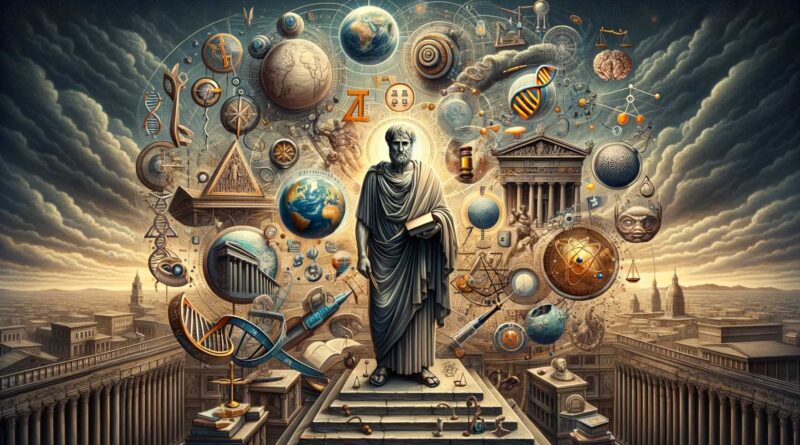The Influence of Aristotle on Modern Thought
Aristotle (384–322 BCE), the ancient Greek philosopher, is one of the most pivotal figures in Western intellectual history. As a student of Plato and tutor to Alexander the Great, Aristotle’s works span metaphysics, ethics, politics, biology, logic, and more, laying foundational principles that continue to shape modern thought. His emphasis on empirical observation, logical reasoning, and systematic inquiry revolutionized knowledge production, while his ethical and political frameworks remain relevant in contemporary debates. Aristotle’s influence permeates science, ethics, and politics, providing tools for understanding the natural world, human behavior, and societal organization. This comprehensive exploration examines how Aristotle’s ideas shaped these fields, their evolution through history, and their enduring relevance in 2025, supported by historical accounts and modern applications. His legacy is a testament to the power of reason to navigate complexity, offering insights that remain vital in addressing today’s challenges.

Aristotle’s Life and Intellectual Context
Aristotle’s method—combining observation, logic, and systematic classification—contrasted with Plato’s idealism, prioritizing the physical world over abstract forms. This empirical approach, coupled with his focus on practical wisdom (phronesis), made his ideas adaptable across eras.
Empirical Observation and Classification:
Empirical Observation and Classification: Aristotle’s studies in biology, detailed in History of Animals and Parts of Animals, involved dissecting organisms and classifying them based on shared traits, establishing taxonomy’s foundations. He identified over 500 species, noting differences like viviparous vs. oviparous reproduction, a precursor to modern zoology. His emphasis on observation over speculation inspired medieval scholars like Albertus Magnus and modern scientists like Linnaeus.
Physics and Cosmology:

While Aristotle’s geocentric model and physics (e.g., five elements: earth, water, air, fire, aether) were later disproven, they dominated medieval science through Ptolemy and the Scholastics. His insistence on systematic explanations paved the way for Galileo and Newton, who built on his methods while correcting his errors.
Modern Relevance:
In 2025, Aristotle’s empirical legacy informs scientific practices. Bioinformatics uses his classification principles, while his causal framework shapes systems biology. His insistence on evidence-based inquiry remains a cornerstone of peer-reviewed research, guiding AI-driven discoveries at institutions like xAI.
Influence on Ethics: Virtue and the Good Life
Virtue Ethics: Aristotle argued that virtues (e.g., courage, justice, temperance) are habits cultivated through practice, lying at the “golden mean” between extremes (e.g., courage is the mean between cowardice and recklessness). Unlike rule-based ethics (e.g., Kant’s deontology), virtue ethics focuses on character, influencing modern thinkers like Alasdair MacIntyre. His maxim, “We are what we repeatedly do. Excellence, then, is not an act but a habit,” resonates in personal development.
Modern Relevance: In 2025, Aristotle’s virtue ethics guides ethical frameworks in technology (e.g., AI fairness at xAI), corporate governance, and public policy. Debates on social media ethics or climate responsibility echo his call for moderation and justice, while his focus on flourishing informs mental health initiatives.
Criticisms and Limitations

Aristotle’s ideas, while foundational, have flaws. His geocentric cosmology and physics were overturned by Copernicus and Newton. His views on women and slavery, reflective of his time, are ethically problematic today; he considered women inferior and slavery natural for some. His elitism—favoring aristocracy over pure democracy—clashes with modern egalitarianism. Yet, his methods of inquiry remain adaptable, allowing reinterpretation.
Legacy in 2025: A Timeless Framework
Aristotle’s influence persists across disciplines. In science, his empirical approach informs research methodologies; in ethics, his virtue framework guides personal and professional conduct; in politics, his ideas on governance shape democratic institutions. His quote, “The ultimate value of life depends upon awareness and the power of contemplation,” underscores his enduring call for reflective action. As global challenges like AI ethics, climate change, and political polarization intensify, Aristotle’s emphasis on reason, balance, and the common good offers a blueprint for navigating complexity.
Aristotle’s influence on modern thought is profound, shaping science through empirical methods, ethics through virtue theory, and politics through balanced governance. His ideas, preserved and adapted across centuries, remain relevant in addressing 2025’s challenges, from AI ethics to democratic stability. Despite limitations, his call for reason and practical wisdom endures, as seen in his words: “Knowing yourself is the beginning of all wisdom.” For deeper exploration, consult Aristotle’s works or modern analyses by Nussbaum. If you’d like a focus on a specific field or a visual timeline of his influence.
